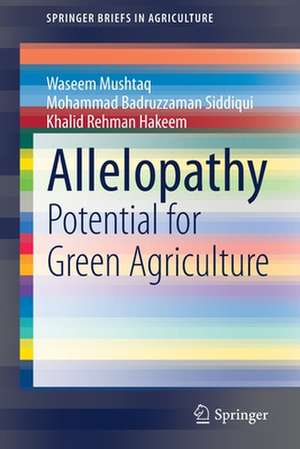Allelopathy: Potential for Green Agriculture: SpringerBriefs in Agriculture
Autor Waseem Mushtaq, Mohammad Badruzzaman Siddiqui, Khalid Rehman Hakeemen Limba Engleză Paperback – 26 feb 2020
Din seria SpringerBriefs in Agriculture
-
 Preț: 381.00 lei
Preț: 381.00 lei -
 Preț: 376.43 lei
Preț: 376.43 lei -
 Preț: 348.72 lei
Preț: 348.72 lei -
 Preț: 377.18 lei
Preț: 377.18 lei -
 Preț: 379.30 lei
Preț: 379.30 lei -
 Preț: 376.22 lei
Preț: 376.22 lei - 15%
 Preț: 462.05 lei
Preț: 462.05 lei -
 Preț: 355.07 lei
Preț: 355.07 lei -
 Preț: 376.04 lei
Preț: 376.04 lei -
 Preț: 388.23 lei
Preț: 388.23 lei -
 Preț: 343.51 lei
Preț: 343.51 lei -
 Preț: 379.68 lei
Preț: 379.68 lei -
 Preț: 375.45 lei
Preț: 375.45 lei -
 Preț: 377.18 lei
Preț: 377.18 lei -
 Preț: 374.30 lei
Preț: 374.30 lei
Preț: 355.48 lei
Nou
Puncte Express: 533
Preț estimativ în valută:
68.02€ • 71.02$ • 56.30£
68.02€ • 71.02$ • 56.30£
Carte disponibilă
Livrare economică 14-28 martie
Livrare express 27 februarie-05 martie pentru 20.60 lei
Preluare comenzi: 021 569.72.76
Specificații
ISBN-13: 9783030408060
ISBN-10: 303040806X
Pagini: 69
Ilustrații: X, 69 p. 1 illus.
Dimensiuni: 155 x 235 x 7 mm
Greutate: 0.12 kg
Ediția:1st ed. 2020
Editura: Springer International Publishing
Colecția Springer
Seria SpringerBriefs in Agriculture
Locul publicării:Cham, Switzerland
ISBN-10: 303040806X
Pagini: 69
Ilustrații: X, 69 p. 1 illus.
Dimensiuni: 155 x 235 x 7 mm
Greutate: 0.12 kg
Ediția:1st ed. 2020
Editura: Springer International Publishing
Colecția Springer
Seria SpringerBriefs in Agriculture
Locul publicării:Cham, Switzerland
Notă biografică
Dr. Waseem Mushtaq received his PhD from the Department of Botany at Aligarh Muslim University, India. His study focuses on allelopathy.
Dr. Mohammad Badruzzaman Siddiqui is a Professor in the Department of Botany at Aligarh Muslim University, India. His field of specialization and teaching interest is in Allelopathy (Environmental Botany) and Plant anatomy. Dr Siddiqui produced nine Ph. Ds and two M. Phils in the field of Plant taxonomy and ethnobotany, Allelopathy and Plant anatomy and also published more than 110 papers in various journals of National and International repute. He also published 6 monographs from Lambert Academic Publishing Company Germany, 6 popular articles in Science Reporter CSIR Publication, New Delhi .He is member of various scientific societies. He delivered 16 lectures & invited talks and also chaired15 scientific sessions in various nationaland international conferences.
Dr. Khalid Rehman Hakeem is a Professor at King Abdulaziz University, Jeddah, Saudi Arabia. He has completed his Ph.D. (Botany) from Jamia Hamdard, New Delhi, India in 2011. Dr. Hakeem has worked as Post Doctorate Fellow in 2012 and Fellow Researcher (Associate Prof.) from 2013-2016 at Universiti Putra Malaysia, Selangor, Malaysia. His specialty is Plant Eco-Physiology, Molecular biology, Plant-Microbe-soil interactions, Medicinal plant research and Environmental Sciences and so far has edited and authored more than 25 books with Springer International, Academic Press, etc. He has also to his credit more than 110 research publications in peer reviewed international journals, including 40 book chapters in edited volumes with international publishers. Dr Hakeem is the recipient of many national and international awards and fellowships.
Textul de pe ultima copertă
Allelopathic studies may be defined in various aspects; weed against weed/crop and vice versa. This book focuses on the ways to utilize the allelopathic potential of weeds or crops for controlling weeds in the agroecosystems. Vigorous use of herbicides is poisoning our environment at an alarming rate; allelopathy can be employed as a useful alternative to control weeds naturally under field conditions. The book contains chapters on the history of allelopathy; allelopathic potential of several important crops (rice, wheat, sorghum, maize, mustard, sunflower) and weeds (members of Solanaceae, Convolvulaceae, Asteraceae, Verbenaceae). Moreover, it highlights how the allelopathic potential of these weeds and crops can be employed effectively to suppress weeds under field conditions. The book also discusses topics on the role of allelochemicals in agroecosystems; impact on local flora; biotic stress induced by allelochemicals; mechanism of action of allelochemicals and future prospective ofallelopathy. Prepared with basic concepts and importance of allelopathy, this book is intended for the agricultural community, botanists, students and researchers.
Caracteristici
Provides up-to-date information on the allelopathic importance of weeds and crops Enlightens how the science of weed and crop allelopathy can be used as an alternative to replace chemical herbicides Highlights the biotic stress induced by allelochemicals and their mode of actions
